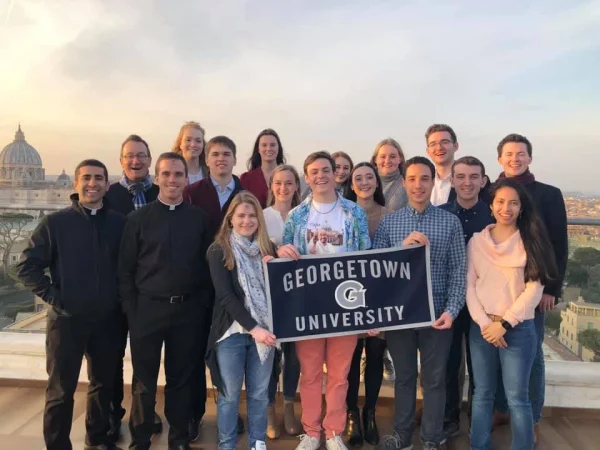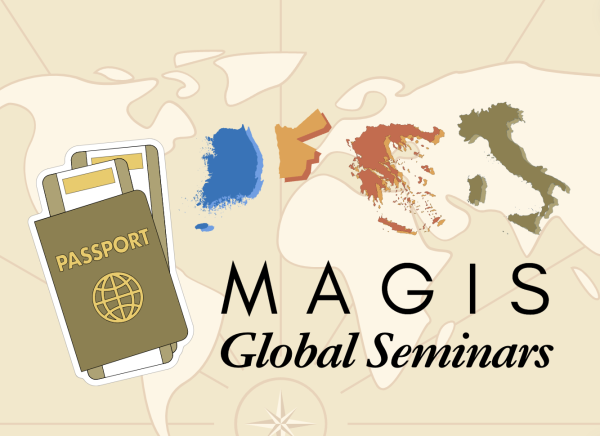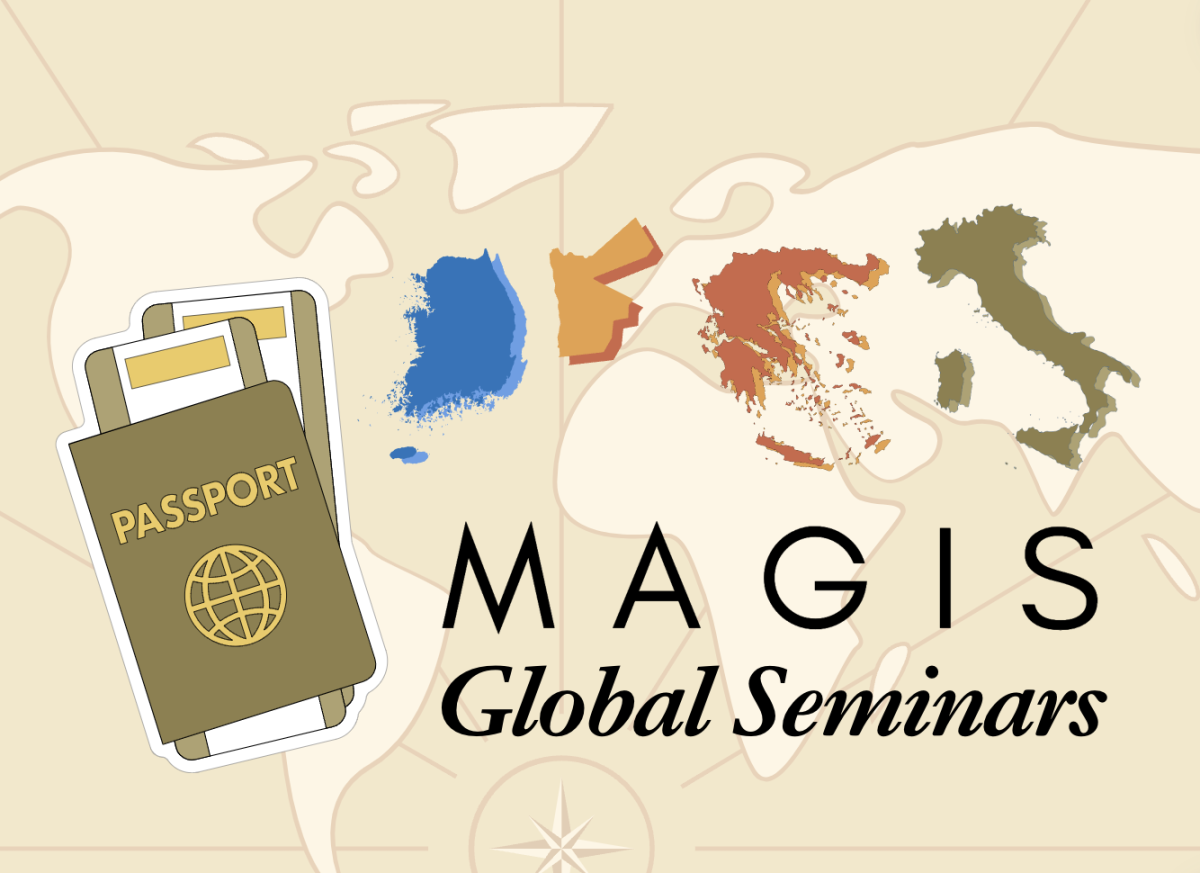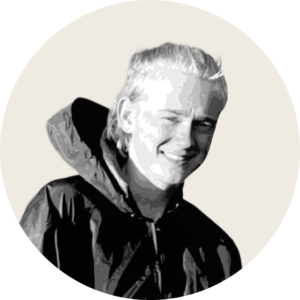After graduating from college in the 1970s, Fr. Ron Anton, S.J., spent the summer with his roommates traipsing through the Greek isles and sleeping under the stars on the beaches of the Aegean Sea.
Anton said he will return to Athens for the first time in over 50 years on Wednesday — this time as a Jesuit superior and accompanying chaplain for the Reading St. Paul in Greece Magis seminar, one of four immersive, week-long learning and travel experiences offered this year to Georgetown University undergraduates.
“I’m looking forward to it every bit as much as the students are looking forward to it,” Anton told The Hoya. “The good thing about this trip and St. Paul is that the journeys of St. Paul were synchronous with the beginning of the church.”
The seminars, which the Office of Mission & Ministry puts on, take students across the United States and Eurasia, including to Italy, Greece, South Korea and Jordan this year, as well as Nepal, Jerusalem and the southern United States in years past.
On the Hilltop, undergraduate Hoyas can choose from a plethora of offerings in the Theology and Religious Studies Department, including the two courses required of all students — an introductory course and an upper-level elective.
According to Fr. Mark Bosco, S.J., who designed the Magis program and serves as vice president for mission and ministry, the seminars — which are backed by an extensive fundraising effort — seek to expand on existing in-classroom conversations through on-the-ground immersion at religious sites and cultural centers.
“I’m an academic by training, and so I wanted to see if I could connect the spiritual and the intellectual in a really impactful way, and they got on board,” Bosco said. “So we never know how many we’re going to do, depending on how much money we can raise.”
Pilgrimage, Tourism and Community
Bosco, whose experience teaching summer courses in Italy inspired him to imagine ways to develop short-term but similarly immersive experiences, said service and connection are two central components of the Magis program, which he said encourages students to view their trips as pilgrimages encompassing not just academics, but personal and spiritual reflection.
“We are situated here in D.C., but we’re looking to say, ‘How can we serve the world?’” Bosco told The Hoya. “And to serve the world is to not just have a bucket list of places to go, but to serve it. We say that a tourist goes through a place, but a pilgrim lets the place go through them.”
Bosco, who has researched and taught extensively about Rome, said intimate moments of personal reflection often arise in small group settings where students — like his group of 15 in Italy in 2023 — can embrace the idea of pilgrimage in connecting with places or objects like the tomb of St. Peter, an early Christian saint buried in Rome.
“I was with a group of students, and we’re like, three to four feet from the bones of St. Peter, and a student just knelt down, and all the other students didn’t know what to do,” Bosco said. “And they also knelt down, and everybody was crying, because it was a very emotional thing.”
“But coming out of that we had a pranzo, a lunch, and we just talked about that — it’s just an emotional moment,” he added. “To be able to share that moment together was really quite lovely.”
Renato Llontop Calosi (SFS ’24) was among the first class of post-lockdown Magis students, attending a summer immersion in northern Spain that followed in the footsteps of the pilgrimage of St. Ignatius of Loyola, the founder of the Jesuit order.
Llontop Calosi, whose Spain trip marked his first to Europe, said the structure of the seminars enables students to move beyond tourism and into an immersive personal reflection.
“When we are pilgrims, we like to say that it’s not just like we are tourists, but we’re actually more grounded into some sort of spiritual trip,” Llontop Calosi told The Hoya. “For the life of St. Ignatius, it was more for me to understand where does the Jesuit identity or those Jesuit values connect to Georgetown? Why are they so important to them?”
As a Catholic university affiliated with the Jesuit order, Georgetown prides itself on values of interfaith dialogue, spirituality, service and leadership

The year following his trip to Spain, Llontop Calosi traveled to Rome with Bosco for a Magis seminar on the city’s history. As a second-year pilgrim, Llontop Calosi said his immersion was multifaceted, encompassing faith, culture and language.
“It was not just an immersion with faith because of course there’s a lot of culture that you can also explore in many of these trips,” Llontop Calosi said. “I think it’s a good combination, at least, in which you can see religion, you can also see culture, you can also see society.”
Abigail Bettendorf (SOH ’26) will travel with Anton and Ori Soltes, a professor of theology and Jewish civilization, to Greece. As an ESCAPE leader guiding first-year students on reflective retreats, Bettendorf said she hopes to think about her own pilgrimage.
“I hope that going to the places in Greece that Paul wrote to, as well as where his missionary activities took place, will help me to better understand these texts that are so influential and have become incredibly important to me personally as I grow and mature in my Christian faith,” Bettendorf wrote to The Hoya.
“I’m excited to walk in his footsteps and pray that, in doing so, the Lord continues to stir up in me the motivation to live the faithful life that Paul described and share this hope and faith that I have with others like Paul did,” she added.
A chaplain accompanies professors and students in each seminar, an aspect of the program which Bosco said sets the Georgetown programs apart.
“We will get to know each other on the Hilltop,” Bosco said. “Then let’s travel together, talk to each other, learn about the history, faith, culture and do it as a group and come back.”
Bosco said he invites course ideas from professors, and this year, Min-Ah Cho, a theology professor, will lead a group of 14 students to South Korea. Cho said she first proposed the idea during a meeting with Bosco, who proved immediately receptive.
“Last December I visited Korea and came back, and I had a meeting with Father Bosco,” Cho told The Hoya. “I shared my interest in offering a course like this, and then Father Bosco found it really exciting and interesting, and he said, ‘Why don’t you do offer it for the spring semester?’”
Similarly, Cho said she has been in close contact with the Jesuit order in South Korea, who she said have been hospitable and helpful in making arrangements for cross-cultural engagement.
“In each place, I have been working with Catholic groups and activists, so they are collaborating with us in many different ways — offering housing and preparing for food and meeting,” Cho said.
Seminars, Social Justice
Nearly 60% of Georgetown undergraduates study abroad — an endeavor which requires students to pay full tuition, with applicable financial aid, plus costs of travel and living expenses.
With the Magis seminars, however, Bosco said he prioritizes inclusivity, and that his fundraising efforts fully covered the costs of seven trips in 2023 alone, taking students to destinations across Europe and the United States.
He said the program seeks to engage students with financial need, including members of the Georgetown Scholars Program (GSP), which serves first-generation and low income students.
“We really try to engage our students on scholarship because they probably won’t have the means, perhaps, to go away for an entire semester abroad,” Bosco said. “Anybody who signs up who’s GSP, for example, they’re highly considered for the class.”
Anton, echoing the importance of going abroad, said he hoped the program would allow student pilgrims to expand their perspectives and connect with course material.
“Some students in this class are going because they didn’t have a chance to go abroad,” Anton said. “This is their chance to go abroad. So for that, it’s good for them because they will get out of the country. They will see different ways of doing things. Hopefully, some of the themes from St. Paul will also come across as they do this.”

Financial need is not the only factor in seeking to broaden student engagement, according to Bosco. Particularly for students under the Deferred Action for Childhood Arrivals (DACA) program, which protects undocumented immigrants who arrived in the United States as children from deportation, immigration status can be a barrier to travel. People with DACA status must take additional steps to travel abroad, and requests to the federal government are not always granted.
Bosco said he planned a domestic seminar so students whose immigration status may inhibit international travel would still be able to make a pilgrimage.
“We did a civil rights pilgrimage to the South,” Bosco said. “That one we did especially because we wanted to make sure that students who were DACA or could not leave the country had an opportunity to do one of these as well.”
The curriculum of Magis seminars also focuses on elements of social justice, not just religion and pilgrimage. Cho, who grew up in South Korea, said her first-hand experiences inspired her to craft a course outline and itinerary that surveys both the nation’s painful history and its hope for a brighter future.
“When you actually go to Korea, we see and find the hope and joy through our meeting with the people living there,” Cho said. “People who have been working diligently for the peace and justice of the country, and people who want to make connections and who already stand up for the justice and democracy of the country.”
Immersion in Theology
As a previous pilgrim to the Sea of Galilee, Anton said being in the real-life setting of biblical stories changed the way he engages with such passages.
“So when you’re there, and then you’re on the spot, you’re having the water from the Sea of Galilee wash up on your feet, and you read the story,” Anton said. “And as you read the story, you say, this is exactly the way it looked when Jesus was here.”
“This is the water, the shore, this is exactly it — that changes it every time you read that story from then on for the rest of your life.”
Anton said his past experience on pilgrimage has taught him that physical presence goes a long way in terms of enriching texts that students have studied only in a classroom setting, which he feels will be particularly impactful in Greece.
“This is where Paul stood in the Agora in Athens when he wrote this,” Anton said. “And we’re going to do that and reflect on it.”
Llontop Calosi, who is in his final year at Georgetown, will attend a Magis seminar in Jordan that surveys interreligious interactions. He said this trip is markedly different from his first two in that it moves from history into modern diplomacy and politics.
“Jordan allows you to see not just the faith component, but how diplomacy with faith is being applied, how education is being applied, how policies are being applied, how economic-wise, faith literally overlaps with many different branches or with many different sectors within society,” he added.
In addition to the Magis seminars, Georgetown offers students opportunities to travel for spring break with the School of Foreign Service’s Centennial Labs (C-Labs), which similarly take undergraduates abroad for experiential learning.
Sydney Freed (SFS ’26) will travel to Cairo, Egypt, for a course on cultural heritage and its resonances in the Arab world, and said the opportunity will allow her to self-reflect — in particular through connecting with students at an Egyptian university, much like Cho’s students will do in South Korea.
“I think in classes, especially ones that push me to move outside of my westernized experience, to just pause and think, this is not bad or negative, but, ‘How can I think about the way that I have things framed in my mind?’ and then think about, ‘What are alternate ways to approach this subject matter?’” Freed told The Hoya in an interview.
“Because when you look at history, it’s obviously not objective,” Freed told The Hoya. “So what are the different subjective ways people think about it, and how can that help me develop a more well-rounded view of what we’re talking about?” she added.
Cho said studying the complex, often painful aspects of Korean religious history will prepare students to engage with theological issues and reflections in a new, enlightened manner, much like how the Christian Lenten season prepares believers for the joy of Easter.
“Looking into the darker parts, when you go to Korea, through our meeting with the people, activists, students and scholars, I want students to experience a kind of hope and resurrection,” Cho said.
As a professor, Cho said she hopes her students walk away with a transformative experience that echoes far beyond their week in South Korea.
“The immersive experience it offers is just an amazing experience to students who learn things not only through books or through their brain, but the immersive experience encourages them to take their experience into their heart,” Cho said.









